Libya. The Great Ascent.
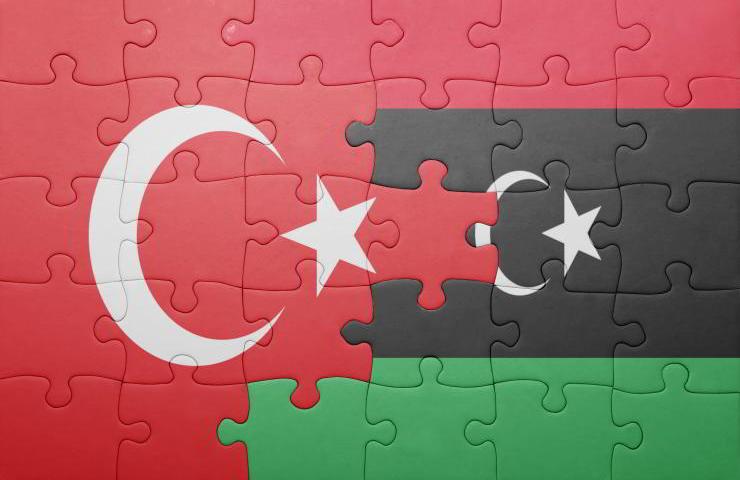
First with Sadat’s mercenaries, then with drones and economic agreements in the waters of the Mediterranean. Finally, the military support marked a turning point in the defence of Tripoli against General Haftar’s men. And now the future of the country passes through Erdoğan.
A ten-year tit-for-tat with the world. This could be the summary of the strategy pursued by the Turkish government of President Recep Tayyip Erdoğan in post-Gaddafi Libya. Marginal in Turkish strategies in Africa for almost 20 years, the doors of Libya opened wide to Erdoğan with the end of the Libyan dictator.
The first move came in 2012 and was a response to Russia. Moscow sent Wagner contractors to Libya to support General Khalifa Haftar, head of the Libyan National Army based in Tobruk. For Erdogan, he was a copy of the Egyptian Abdel Fattah al-Sisi, an enemy of the Muslim Brotherhood, dear to the Turkish leader.
In support of the President of the Government of National Accord, Fayez al-Sarraj, came the Sadat mercenaries, shadow men of Turkish strategies in several Muslim countries; former Turkish soldiers who also carry out training and intelligence tasks.
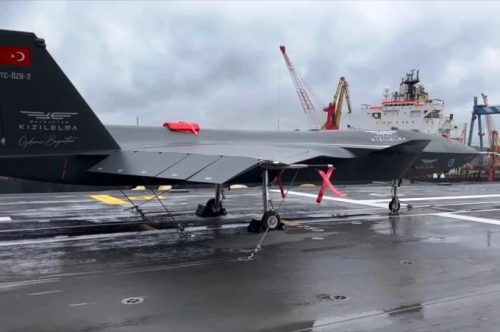
Baykar Bayraktar Kızılelma 2. CC BY 3.0/tolgaozbekcom
Erdogan’s second response came in 2019 and this time it was aimed at the United Arab Emirates, which sent Chinese-made Wing Loong drones to Haftar. In May, the first four Turkish drones docked in Tripoli, aboard a ship flying the Moldovan flag, along with technicians and over 40 armoured vehicles. A drone war began in the Libyan skies that Ankara’s TB2 Bayraktars won, sending the Russians into crisis.
The third response does not arrive on the battlefield and is addressed to French President Emmanuel Macron, who accuses Erdogan of violating the embargo on the shipment of weapons decided by the UN. “Drones serve to rebalance the forces on the field because countries like France arm Haftar. I do not take lessons from those who have always exploited Africans”. Such words uttered by the Turkish head of state sound like a challenge to France not only in Libya, but across the continent.
Troubled waters
A few months went by and in December 2019, the Turkish government concluded an agreement with Tripoli on the delimitation of territorial waters. This time, the response is to the European Union, which supports Greece’s claims in the Eastern Mediterranean, but also to al-Sisi’s Egypt, with which relations are at an all-time low.
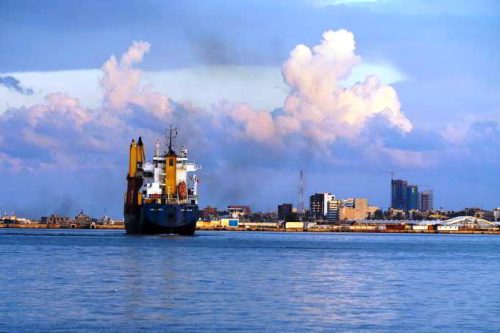
A container ship leaves the port of Tripoli. In December 2019, the Turkish government concluded an agreement with Tripoli on the delimitation of territorial waters. Shutterstock/Hussein Eddeb
The agreement with the Libyan government provides for a division of the maritime borders of the two countries in a stretch between North Africa and Turkey, with the border established south of Cyprus. Erdoğan is thus reacting to Europe’s sanctions for drilling carried out off the island, but also to the exclusion from the forum on gas reserves desired by Greece, Cyprus, Egypt, Israel, Jordan and Italy.
The agreement with Tripoli averts the risk of a gas pipeline connecting the Israeli and Cypriot fields with Europe, excluding Turkey. A crucial objective for Erdoğan, now called upon to defend the agreement and the Tripoli government from Haftar’s attacks.
Hence, the need for the second agreement; the delimitation of maritime borders is accompanied by military cooperation.
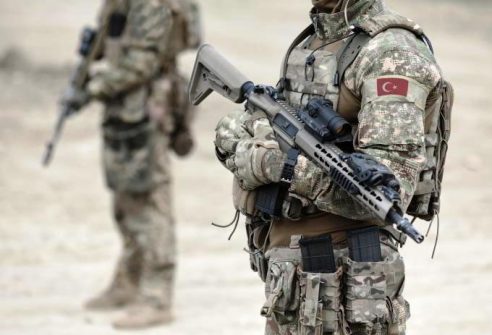
Soldiers with an assault rifle and flag of Turkey. At the beginning of 2020, the Turkish parliament approved the sending of troops to Libya. Shutterstock/ Bumble Dee
At the beginning of 2020, the Turkish parliament approved the sending of troops to Libya. The mission was aimed, as stated in the text, at “supporting the legitimate government of Tripoli”, defending “Turkey’s rights established by the protocols signed by the two governments”, preventing “the resurgence of terrorist groups”, “mass migrations” and guaranteeing “peace and stability” through the relaunch of “a political process”. The Turks will make an important contribution in terms of training and strategy for the defence of Tripoli. However, drones will be a decisive factor. The ones getting their hands dirty on the battlefield are the mercenaries of the Free Syrian Army (FSA), whom Ankara trained and used in operations in Syria. According to data from the Syrian Observatory for Human Rights, around 2,000 Syrians arrive in Tripoli and defend it against Haftar.There is no shortage of accusations against Erdoğan from the European Commission and, once again, the response is not long in coming: “They are not part of our mission. We go in with coordination tasks; the Syrians will be able to defend our people who are not fighting”, was Erdoğan’s response.
The strategy of Ankara today
The Turkish president’s strategy in Libya is based on three different fronts: the consolidation of Turkey as a diplomatic interlocutor, military support and control in the eastern Mediterranean. A clear message to Greece, Egypt and Israel: a possible gas pipeline to Europe will not be done without me. A triple objective that Erdogan achieved with the defeat of Haftar in June 2020: “Our secret services have turned the situation around”, says the president, who then defines Haftar as a “coup plotter”, “the main obstacle to a political solution”, author of “a bloodbath” supported by Egypt, Russia, France and the Emirates, who will be “judged by history”.The end of the civil war allows Turkey to consolidate its role in Libya. Numerous reconstruction contracts end up in the hands of Turkish companies, but not solely. Ankara trains the army, navy, police and even the coast guard. A move that touches the migrant nerve and weakens Europe.
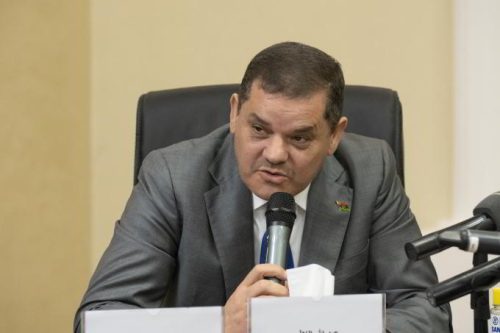
Libya’s Prime Minister Abdul Hamid Dbeibeh during a press conference. Shutterstock/Hussein Eddeb
Serraj’s exit in 2021 did not find Erdogan unprepared, on the contrary. Mohammed al-Menfi was elected president of the National Unity Council and Abdul Hamid Dbeibah was elected head of government. The first phone call of good wishes came from Ankara. Breaking with the 13 months of Turkish protagonism did not seem to suit anyone. The new Libyan leadership was aware of this, and showed no intention of asking for the return of Turkish troops, as the international community would like. The Turkish parliament extended the military mission and Dbeibah’s first trip is to Ankara. The agreements stipulated with Serraj were extended and five new agreements stipulated: Turkey will build three power plants, the international hub of the new Tripoli airport and a large shopping centre. Meanwhile, Turkish exports to Libya have increased by 65% in 2021, reaching 2.4 billion dollars. A growth that is also recognized by the choice of the African Union to hold the ‘African-Turkish Summit 2026’ in Libya, recently announced.
A crisis avoided
Not everything, however, went as planned. The elections in Libya were omitted and at the beginning of 2022, Dbeibah ended up mistrusted by parliament, defeated by his rival Fathi Bashagha. For Ankara, a phase of doubts, wait-and-see attitude and dialogue on two tables began.
On September 1, 2022, both Dbeibah and Bashagha arrived in Ankara.
A double visit organised urgently, just as the clashes resumed
on the streets of Tripoli.
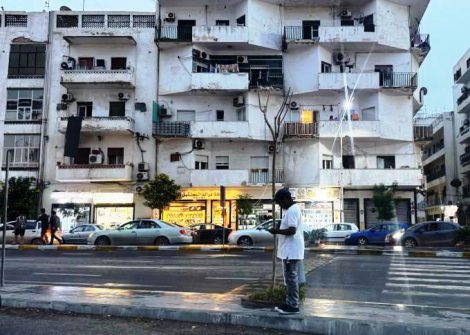
Street in Tripoli. Electricity consumption in the country has exceeded the production capacity of gas and oil-fired plants. Shutterstock/TOSKA_LY
Meetings in which Ankara maintained a very low profile and of which Erdogan will not say a word. What happened in the rooms of the Turkish capital is not known, but more than two years later Dbeibah remained in his place, the weapons in Libya were silent and the Turkish ally central.
Once again, conditions were ideal for a further step: “A memorandum of understanding has been signed with Turkey for the supply of technologies and expertise to develop renewable energy. There will be investments in solar and wind energy,” announced Osama El Durrat, Dbeibah’s energy advisor. Electricity consumption in the country has exceeded the production capacity of gas and oil-fired plants. A problem for Libya that, once again, Erdogan’s Turkey was ready to solve. A move to reiterate that any discussion on the country’s future cannot ignore Turkey’s position and interests.
(GdD) – (The national flag of Turkey and Libya. 123rf)



